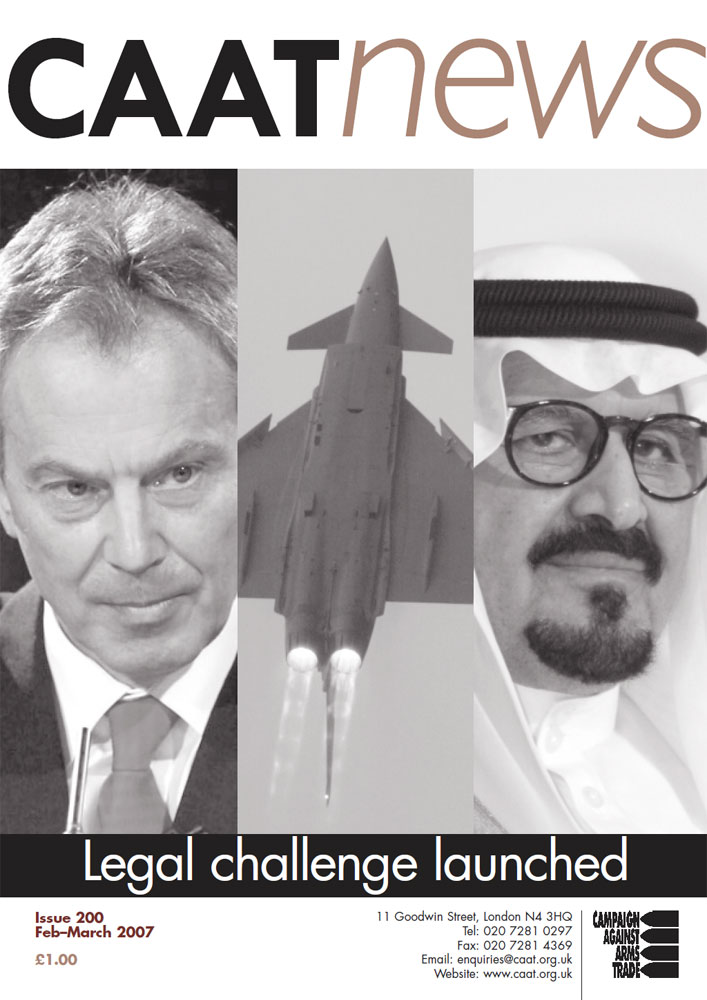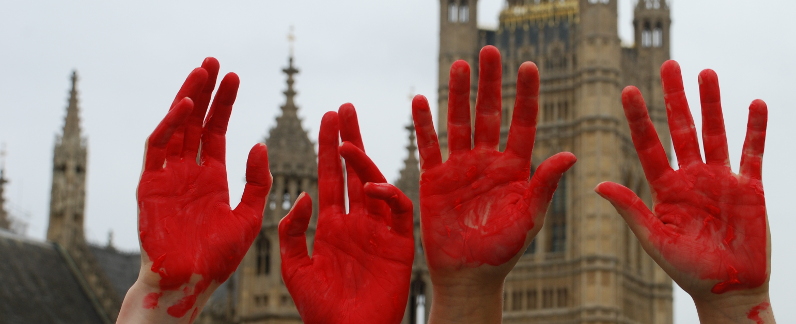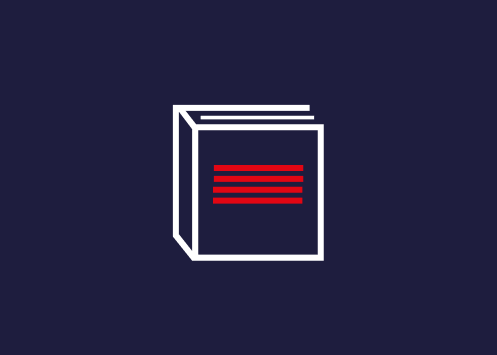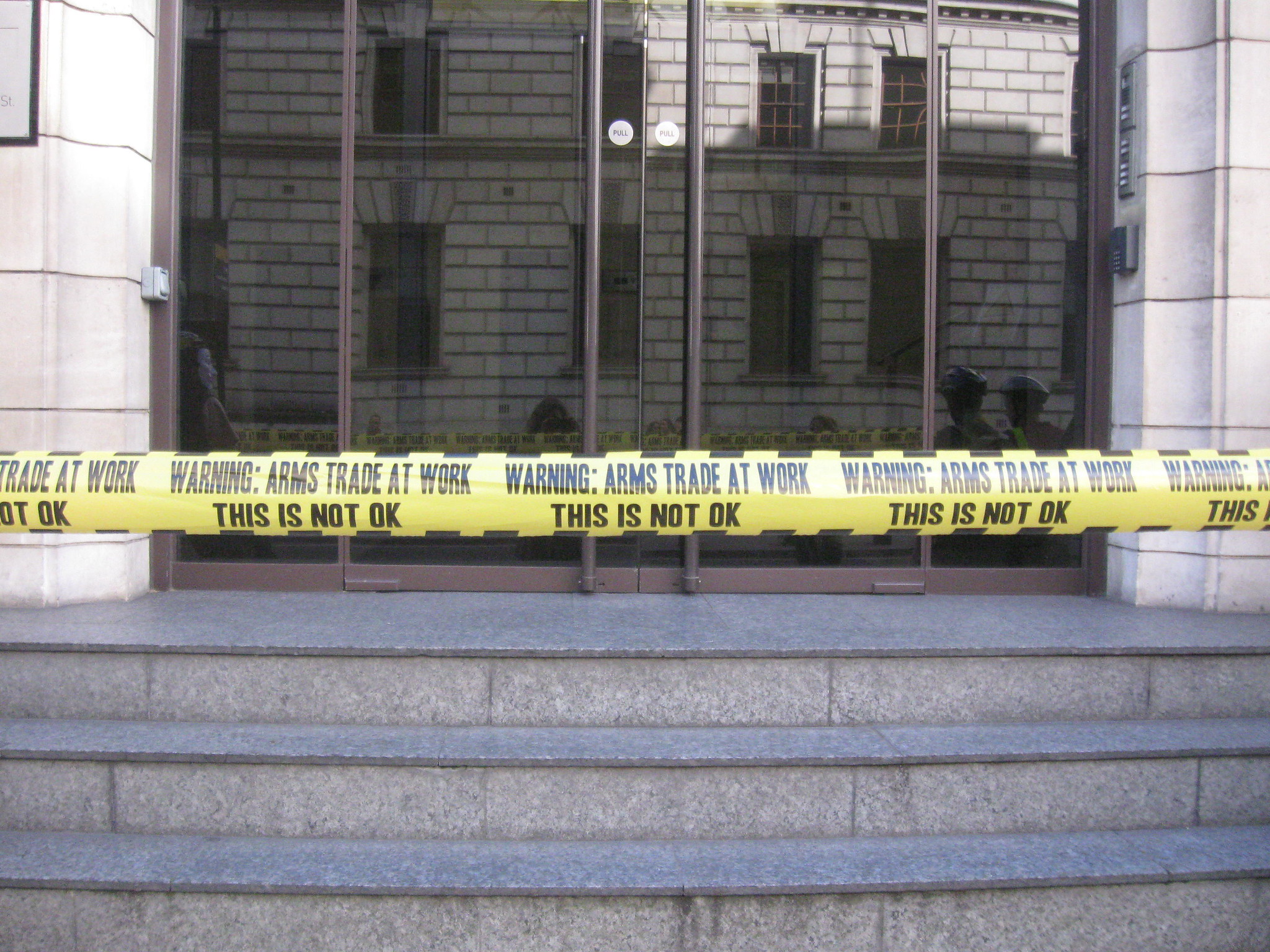MoD misleading of Parliament exposed
In 2006, CAAT research revealed how the UK’s arms sales to Saudi Arabia have been founded on bribery and exposed misleading claims the MoD made to Parliament about bribery in 2003.
The research is corroborated by startling admissions about arms sales to Saudi Arabia made by Lord Gilmour, responsible for the Defence Sales Organisation in the 1970s.
Lord Gilmour, then the UK’s Defence Secretary, told BBC2’s Newsnight:
You either got the business and bribed, or you didn’t bribe and didn’t get the business. You either went along with how the Saudis behaved, or what they wanted, or you let the US and France have all the business. It’s not something you emblazon or are particularly proud of. It just happens to be the terms of trade.
When Newsnight’s interviewer suggested that such bribes were illegal, Lord Gilmour said:
If you are paying bribes to high-up people in the government, the fact that it’s illegal in Saudi law doesn’t mean much.
The material was first revealed on BBC2’s Newsnight on 16 June 2006. The documents used can be downloaded below.
They show that the Parliamentary Committee which scrutinises arms exports (the Quadripartite Committee) was seriously misled by the Ministry of Defence in a memorandum of July 2003 (see Ev 34-35, pages 126-7 of 206). In the memorandum the Ministry of Defence rebutted a Guardian article of 13th June 2003 which stated, inter alia,
the government’s own arms sales department [DESO] is directly implicated in bribery abroad,
special commissions… are even written by civil servants into the secret contracts on government-to-government arms deals
and that
bribery has been at the heart of DESO’s mission from the day the unit was launched nearly 40 years ago.
The Ministry of Defence told Parliament the article was totally without foundation
. In summary the memorandum was designed to leave the reader with the impression that DESO had never condoned bribery in arms sales, and in fact had procedures in place designed to ensure legality and propriety in the handling of Government-to-Government contracts
.
As the documents shown on Newsnight demonstrate, the then Defence Sales Organisation was fully aware of the extent of corruption in arms sales to Saudi Arabia, encouraged the use of practices which were, prima facie, corrupt, and proposed the use of publicly owned companies to pass bribes. The Ministry of Defence suggested to Parliament that the Guardian’s allegations were irresponsible
reporting. These documents clearly show that it is the Ministry of Defence whose conduct is irresponsible.
The arms trade is the most corrupt of all legal international trades (see “Parallel Markets“). It is high time the Government stopped state support for the trade by shutting down Defence & Security Exports, an organisation which is clearly unwilling to tell Parliament the truth about its sordid past.
The question of corruption is obviously crucial
A key document is the survey of the problem of arms sales to Saudi Arabia prepared by the UK Ambassador to Saudi Arabia, Willie Morris, for the new Head of Defence Sales, Lester Suffield in February 1970. In it Morris clearly states corruption is central to arms sales to Saudi, and proposes the use of the Embassy in Jedda to gather intelligence on corruption on behalf of UK arms companies. Note that although Morris says he deals with corruption frankly and at some length
there is little specific about corruption in the paper. The Foreign and Commonwealth Office have censored these pages and are continuing to defy Freedom of Information requests to see them.
They do not tell us what they are doing and we do not enquire
In February 1967 a senior Defence Sales Organisation employee, Harold Hubert, berated the Embassy in Venezuela about their squeamishness over bribery. The document categorically states bribery occurs day by day
in the arms trade, says DSO turns a blind eye and focuses on achieving sales. It states the role of agents is to pay bribes, encourage unnecessary military spending and that their work is complementary
to DSO’s.
Passing on the douceurs
In this document of January 1972, Harold Hubert of the Defence Sales Organisation discusses his recent visit to Saudi Arabia. It is primarily concerned with the UK attempt to sell armoured equipment to the Saudi Arabian National Guard, then run by Crown Prince Abdullah, now the King of Saudi Arabia. As well as suggesting the publicly owned company Millbank Technical Services should pass the douceurs
, he suggests either Khashoggi is offered the cut he wants or we should pull out
.
“A dry country, where one can find a Minister incoherently drunk in his office before noon”
Ambassador Willie Morris’s valedictory despatch of 13 May 1972, to then Foreign Secretary Sir Alec Douglas-Home, contains his frank views about Saudi Arabia. Notable, but not shown on Newsnight, was his statement: the sheer effrontery is breathtaking of a prince who will keep on talking about rights and wrongs, when you know (and he probably knows that you know) that his cut may be 20 per cent of the contract price
.
A note on documents and secrecy
These documents are a mere snapshot of the mountain of evidence of corruption in arms sales to Saudi, and the extraordinary behaviour of diplomats and Ministry of Defence officials, already available for public inspection at the National Archives in Kew, South-west London.
However, even after almost forty years, there is heavy censorship of many documents and some files have been withheld in their entirety. CAAT is using Freedom of Information laws to fight the cover-up being orchestrated by the Foreign and Commonwealth Office, so that the public may know the truth.
A paper looking at the general history of the UK Government’s involvement in arms trade corruption is available here.




